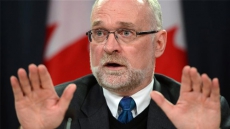TORONTO — A man convicted of first-degree murder more than a decade ago was finally exonerated Friday after the Crown announced it would not prosecute him again.
The decision comes a year after the Supreme Court of Canada unanimously decided Leighton Hay should get a new trial on the basis of new hair evidence.
"He's out, he's free," an excited Win Wahrer of the Association in Defence of the Wrongly Convicted said minutes after the brief court Ontario Superior Court hearing.
"He was released today. He just wants to go home at this point."
Last November, the top court made its ruling after hearing fresh evidence about the hair samples that seriously undermined the Crown's case against him.
Hay was charged after two men burst into a community fundraiser at a Toronto nightclub in July 2002 and gunned down a respected community figure, Colin Moore, in the kitchen over a disputed cover charge.
The identity of one of the shooters, Gary Eunick, was never in doubt and he was convicted and jailed for life.
The Crown alleged Hay, then 19, was Eunick's dreadlocked accomplice based largely on hair found in a newspaper in his bathroom garbage as well as in the electric razor on his nightstand.
At their trial in 2004, prosecutors argued Hay, who always denied any part in the killing, had shaved his scalp to change his appearance after the shooting.
The one witness who claimed to have identified Hay as a gunman had pointed to his image in a photo line-up, saying he looked more like the second gunman than the other 11. She was shown a second line-up three weeks later and did not choose Hay.
Nevertheless, the jury convicted him of first-degree murder.
The wrongly convicted association became involved after Ontario's top court rejected his appeal.
At the association's request, forensic experts determined the hair samples did not come from his scalp but from his face.
That undermined the Crown's belief he had rushed home after the killing and shaved his dreadlocks.
The Supreme Court said the new evidence could have made a crucial difference and quashed the conviction.
The Crown announced Friday it would not proceed against him.
Hay, who suffers from mental illness, has spent most of his time in custody in the psychiatric wings of two Canadian penitentiaries.
"Leighton has been through a nightmare for all these years," his lawyer, James Lockyer said.
"This was a miscarriage of justice of the highest order."
At the time of the Supreme Court decision, Lockyer said he didn't think his client understood what had transpired and would likely need to live in a psychiatric hospital.
However, Wahrer said he would be living with his parents.





